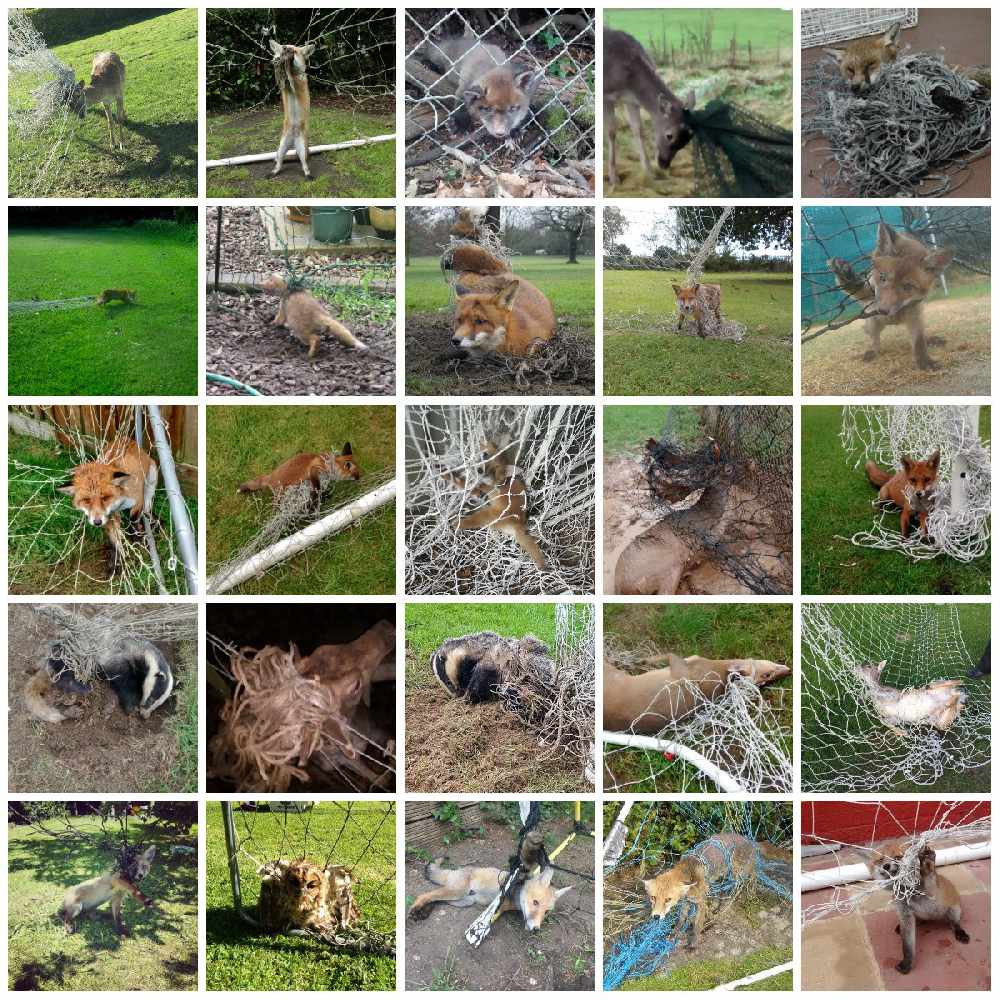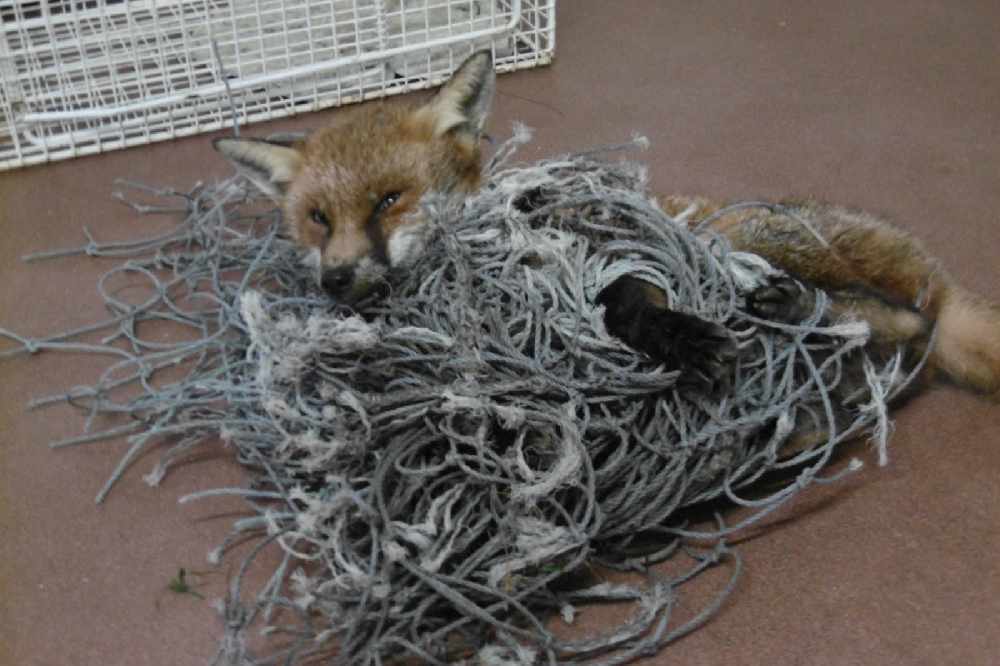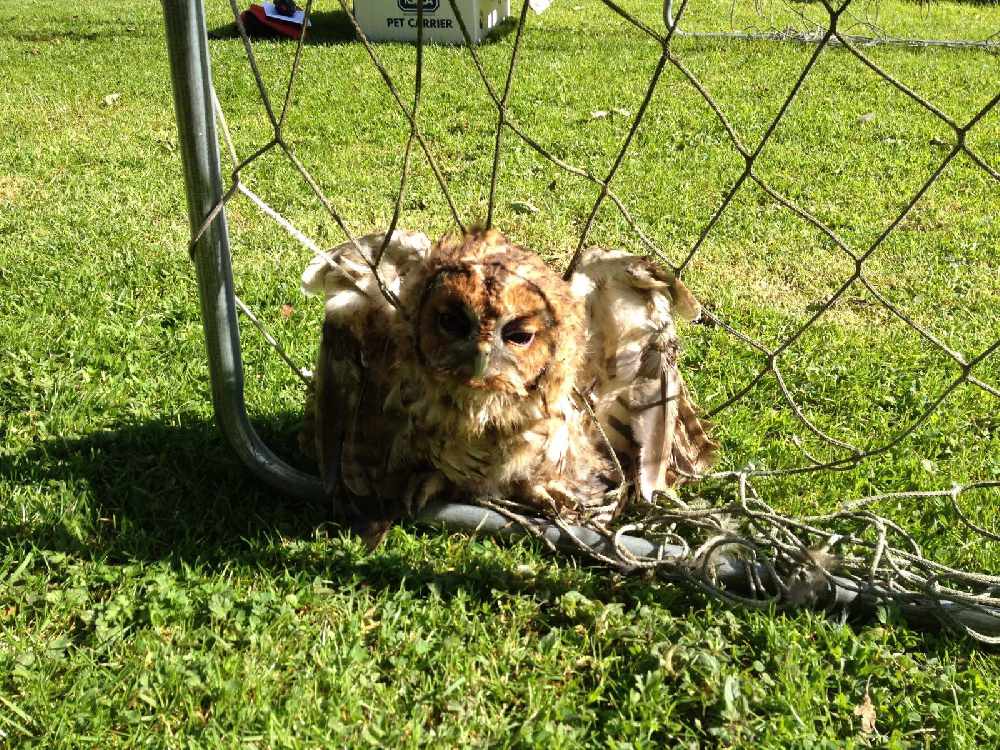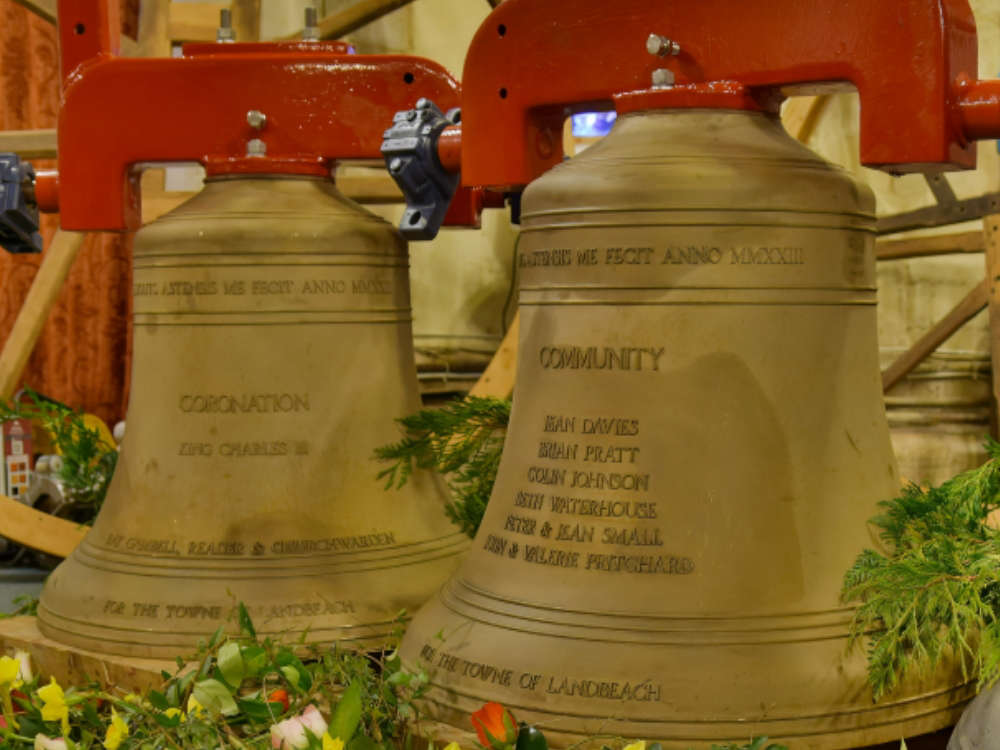
The number of animals tangled in netting increases in the summer months with the South East recording the highest number.
The RSPCA is releasing a collage of pictures of wildlife stuck in netting to remind people of its dangers - as figures showed that the charity rescued over a thousand tangled animals last year.
The shocking photos show how easily animals can get tangled in sports or garden netting - which can result in fatal injuries.
In total, 1,032 animals were rescued from netting by RSPCA officers in 2016. Of those the largest number was the South East with 405 rescues recorded with 125 of those in the Greater London area.
The number of netting rescues RSPCA officers carry out increases drastically in the peak of summer. Last year in July, 198 animals were rescued after getting tangled in netting - compared to 20 in January.
From May to July last year, when the weather was warmer, 501 animals were rescued from netting.
Sports netting, such as football and tennis netting, and pond and fruit netting are the main culprits which wildlife are rescued from.
Recent incidents include:
A fox which became weak and died after getting his entire body severely tangled in goal netting in Cannock, Staffordshire;
A fox cub waiting next to his brother who had been fatally strangled by a goal netting in Stockport.
‘If they go unnoticed for a short time, they can really suffer’
 Llewelyn Lowen, scientific information officer at the RSPCA, said: “We hope that these photos will shock people and make them realise the damage that netting can cause. Sadly, it is something that our officers see an increase in at this time of year. Some animals survive, but very sadly many animals suffer fatal injuries, often as a result of struggling to get free.
Llewelyn Lowen, scientific information officer at the RSPCA, said: “We hope that these photos will shock people and make them realise the damage that netting can cause. Sadly, it is something that our officers see an increase in at this time of year. Some animals survive, but very sadly many animals suffer fatal injuries, often as a result of struggling to get free.
“There have been instances, for example, of fox cubs strangling themselves to death because they have been trying to free themselves. It doesn’t take too long with them thrashing about trying to escape before they become seriously trapped and are then unable to free themselves.
“If they go unnoticed even for a short time, they can really suffer. The tight net can cut off the blood supply to their limbs, damage bones where they have tried to frantically escape, or worst of all, they could be strangled to death.
“There is one simple way to prevent this from happening - please remove sports nets after use and store them safely away. It only takes a few minutes and yet it could save an animal from suffering a horrible death.
“Where netting can’t be removed, such as pond or fruit netting, we recommend replacing them with solid metal mesh.”
Classed as an emergency
When the RSPCA receives a call from a member of the public about an animal tangled in netting, it is classed as an emergency and the nearest RSPCA officer is tasked to go and rescue the animal.
If they can free the animal themselves they will carefully cut away the netting before checking the animal over. If they are not injured then they are immediately released back into the wild.
 However, there are instances where the animal is so severely tangled that they have to be sedated and taken to a wildlife hospital for all of the netting to be cut away.
However, there are instances where the animal is so severely tangled that they have to be sedated and taken to a wildlife hospital for all of the netting to be cut away.
Lee Stewart is manager of the RSPCA’s Stapeley Grange Wildlife Centre, in Cheshire - where wildlife suffering from net-related injuries are taken by RSPCA officers to recover. He said: “We have had cases of animals so badly tangled that they are brought in with the netting still round their bodies and the only way to safely free them is to sedate them.
“Sadly over the years we have had many wild animals come into the centre suffering from injuries as a result of getting tangled in netting - most commonly foxes and hedgehogs.
“As these animals are nocturnal, they have normally been trapped and struggling all night and so by the time they are found in the morning, they often have very serious injuries and often need veterinary attention to sedate them and remove all the netting.
“It’s very concerning and we know first-hand that netting can cause devastating and life-threatening injuries to all sorts of wildlife. It can so easily be avoided if people are just that extra bit careful when it comes to tidying netting away or picking it up off the ground.”
If you see an animal tangled in netting, do not try to free them yourself - call the RSPCA immediately on 0300 1234 999.
Number of animals rescued by RSPCA from netting in 2016 - by month
|
Jan |
Feb |
Mar |
Apr |
May |
Jun |
Jul |
Aug |
Sep |
Oct |
Nov |
Dec |
Total |
|
20 |
42 |
73 |
103 |
170 |
133 |
198 |
97 |
63 |
64 |
36 |
33 |
1032 |
SOUTH EAST numbers of animals rescued by the RSPCA from netting in 2016
|
County |
Jan-Mar |
Apr-Jun |
Jul-Sep |
Oct-Dec |
Total |
|
Bedfordshire |
3 |
4 |
3 |
0 |
10 |
|
Cambridgeshire |
0 |
3 |
4 |
0 |
7 |
|
City of London |
0 |
0 |
2 |
0 |
2 |
|
East Sussex |
8 |
27 |
25 |
7 |
67 |
|
Essex |
4 |
10 |
15 |
4 |
33 |
|
Greater London |
24 |
68 |
20 |
13 |
125 |
|
Hertfordshire |
4 |
4 |
4 |
2 |
14 |
|
Kent |
14 |
18 |
16 |
4 |
52 |
|
Norfolk |
0 |
4 |
6 |
1 |
11 |
|
Suffolk |
3 |
5 |
9 |
0 |
17 |
|
Surrey |
1 |
7 |
9 |
3 |
20 |
|
West Sussex |
5 |
15 |
20 |
7 |
47 |
|
Total |
66 |
165 |
133 |
41 |
405 |


 Woman dies and man arrested after fatal M11 crash
Woman dies and man arrested after fatal M11 crash
 Cambridge United seal League One status for 2024/25 season
Cambridge United seal League One status for 2024/25 season
 Church bells receive special welcome by Acting Bishop of Ely
Church bells receive special welcome by Acting Bishop of Ely
 Cambridge apprenticeship hub receives Royal seal of approval
Cambridge apprenticeship hub receives Royal seal of approval


